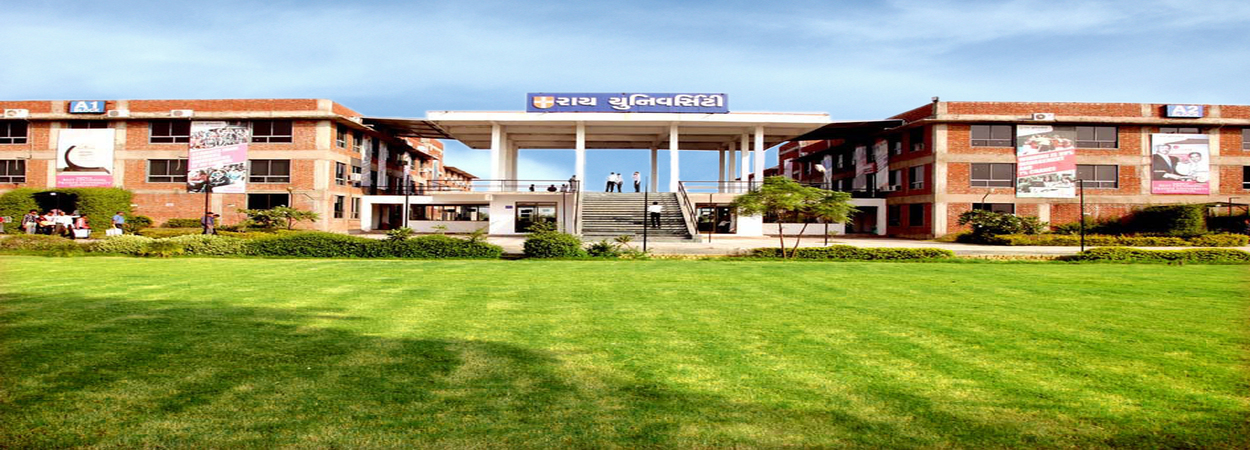Introduction about Ph.D. From Rai University
Rai University, located in the innovative state of Gujarat, stands as a leading institution dedicated to academic excellence and cutting-edge research. The Ph.D. program at Rai University is designed to provide a rigorous academic framework combined with practical research opportunities that empower students to explore new frontiers in their respective fields. With a strong focus on interdisciplinary studies, Rai University offers a stimulating environment where scholars can challenge conventional boundaries, develop innovative ideas, and contribute significantly to the global body of knowledge.
At Rai University, the doctoral curriculum is meticulously structured to integrate advanced theoretical coursework with hands-on research projects. This balance ensures that candidates not only master the foundational concepts of their discipline but also acquire the skills needed to conduct independent and impactful research. The university boasts state-of-the-art laboratories, comprehensive digital libraries, and collaborative research centers, all of which create an ideal atmosphere for scholarly inquiry and innovation.
In addition to its robust academic infrastructure, Rai University emphasizes personalized mentorship and continuous academic support. Faculty members, who are leading experts in various fields, work closely with doctoral candidates to guide them through every stage of their research journey—from conceptualizing ideas to publishing in prestigious journals. The institution’s commitment to ethical research practices and academic integrity further strengthens its reputation as a hub for excellence. Whether your passion lies in engineering, science, humanities, or interdisciplinary studies, the Ph.D. program at Rai University equips you with the knowledge, skills, and confidence to excel in both academic and professional arenas.
Fee Structure for Ph.D. in Rai University
Rai University offers a competitive and transparent fee structure for its Ph.D. program, ensuring that students have access to quality education and advanced research facilities without undue financial burden. The fee structure includes a breakdown of tuition fees, registration costs, and the overall total fee.
| Tution Fee Per Year | Registration | Total Fee |
|---|---|---|
| Rs. 85,000 | Rs. 15,000 | Rs. 100,000 |
Admission Process For Ph.D. in Rai University
The admission process at Rai University is designed to rigorously assess the academic qualifications and research potential of prospective doctoral candidates. The process is transparent and structured to ensure that every applicant is evaluated on merit and suitability for advanced research. The following steps outline the admission process:
- Review the eligibility criteria and detailed admission guidelines on the official Rai University website.
- Complete the online application form with accurate personal, academic, and research details.
- Submit all required documents, including academic transcripts, research proposals, and identity proofs.
- Sit for a written entrance examination that evaluates your research aptitude and subject knowledge.
- Attend a personal interview with the selection committee to discuss your research interests and career objectives.
- Receive the final admission decision based on your overall performance in the exam and interview.
It is essential that all documents are verified and submitted on time to ensure a smooth and efficient admission process.
Ph.D. Subjects in Rai University
The Ph.D. program at Rai University encompasses a broad spectrum of subjects designed to provide comprehensive academic and research training. The curriculum is tailored to meet the interdisciplinary needs of modern research and is structured to offer both core and specialized subjects. The following table provides a snapshot of key subjects:
| Subject | Description |
|---|---|
| Advanced Research Methodology | Focuses on innovative research designs, data collection methods, and statistical analysis techniques. |
| Interdisciplinary Studies | Encourages integration of multiple disciplines to address complex research problems. |
| Quantitative & Qualitative Analysis | Provides comprehensive training in both statistical and qualitative research methods. |
| Special Topics in [Your Discipline] | Offers customized courses focusing on emerging trends and specific research interests. |
Document Required For Ph.D. in Rai University
A complete set of documents is crucial for a successful application to the Ph.D. program at Rai University. The following documents must be submitted to validate your academic credentials and research potential:
- Academic Transcripts and Degree Certificates from all previously attended institutions.
- A detailed Research Proposal outlining your research objectives, methodology, and expected outcomes.
- A comprehensive Curriculum Vitae (CV) highlighting your academic, research, and professional achievements.
- Proof of Identity such as Aadhaar card, Passport, or any government-issued identification.
- Letters of Recommendation from professors or professionals who can attest to your research capabilities.
- A Statement of Purpose (SOP) that clearly explains your motivation for pursuing a Ph.D. and your long-term career aspirations.
Ensure that all documents are current, verified, and formatted according to the university's guidelines to avoid any delays in the application process.
Rai University Ph.D. Syllabus
The Ph.D. syllabus at Rai University is meticulously designed to blend rigorous academic coursework with practical research training. The curriculum is divided into several phases to provide a structured and progressive learning experience. Below is a sample breakdown of the syllabus:
| Phase/Semester | Subject/Module | Credits/Weightage |
|---|---|---|
| Phase I | Core Research Methodology & Foundational Courses | 20 |
| Phase II | Advanced Theoretical Concepts & Elective Courses | 15 |
| Phase III | Interdisciplinary Research & Data Analysis | 25 |
| Phase IV | Thesis Writing, Defense & Publication | 40 |
The syllabus is periodically updated to incorporate the latest developments in research and technology, ensuring a comprehensive and contemporary education.
Rai University Research Methodology
The research methodology training is a cornerstone of the Ph.D. program at Rai University. It is designed to equip you with the necessary tools and techniques for conducting high-quality research. Key elements of the training include:
- Developing a robust research framework and detailed proposal.
- Training in both qualitative and quantitative research methods.
- Workshops on advanced data analysis techniques and statistical tools.
- Emphasis on ethical research practices and maintaining data integrity.
- Regular mentoring sessions and peer review processes to refine your research strategy.
Rai University Highlights
Rai University is celebrated for its academic excellence, innovative research environment, and comprehensive student support services. The table below highlights some of the key features of the institution:
| Aspect | Details |
|---|---|
| Established | A prestigious institution committed to innovation and research excellence |
| Location | Gujarat, India – A region known for its dynamic academic and industrial growth |
| Accreditation | Nationally recognized for high academic and research standards |
| Facilities | Modern laboratories, extensive digital libraries, and collaborative research centers |
| Faculty | Experienced academicians and industry experts offering personalized mentorship |
| Collaborations | Partnerships with leading research institutions and industry organizations |
| Student Support | Scholarships, career counseling, research funding, and mentorship programs |
How To Apply For Ph.D. in Rai University
The application process at Rai University is streamlined to ensure a smooth transition into the Ph.D. program. Follow these detailed steps to complete your application:
- Visit the official Rai University website and navigate to the Ph.D. admissions section.
- Review the eligibility criteria and detailed admission guidelines carefully.
- Fill out the online application form with accurate personal, academic, and research details.
- Upload all required documents, including academic transcripts, research proposal, CV, and identity proof.
- Pay the application fee as per the instructions provided on the portal.
- Submit your application before the deadline and retain a copy for your records.
- Prepare for the entrance examination and personal interview with the selection committee.
- Monitor your email and the application portal for updates regarding your admission status.
Courses After Ph.D. in Rai University
After successfully completing the Ph.D. program at Rai University, graduates have numerous opportunities to further enhance their expertise and career prospects through advanced courses and professional development programs. Some of the popular options include:
- Post-Doctoral Research Programs
- Advanced Certificate Courses in Emerging Research Areas
- Executive Leadership and Academic Management Training
- Specialized Workshops and Skill Enhancement Seminars
- Industry-Academia Collaborative Programs and International Exchange Initiatives
Rai University Scholarship
Rai University is committed to supporting its Ph.D. candidates through a comprehensive scholarship program designed to alleviate financial constraints and promote research excellence. These scholarships provide essential financial aid that covers tuition fees, research grants, and sometimes a living stipend, enabling students to fully focus on their research projects without financial stress. Awarded on the basis of academic merit, research potential, and financial need, the scholarship program is a testament to the university’s dedication to nurturing outstanding scholars. Detailed eligibility criteria, application procedures, and deadlines are available on the official university website. With robust financial support, Rai University empowers its Ph.D. students to pursue innovative research and contribute significantly to their fields.
- Merit-based awards for outstanding academic performance.
- Need-based financial support to cover tuition and research expenses.
- Research grants for conference participation and publication fees.
- Opportunities for international collaborations and academic exchanges.
- Dedicated mentorship and career development support included in the scholarship package.
Rai University FAQ's Regarding Ph.D.
Below are some frequently asked questions that provide clarity on various aspects of the Ph.D. program at Rai University:
- What are the eligibility criteria for the Ph.D. program?
Candidates must hold a relevant Master’s degree with a strong academic record and meet the minimum research experience requirements specified by the university.
- How can I apply for the Ph.D. program?
Applications are submitted online through the official Rai University website by completing the application form and uploading the required documents.
- What is included in the fee structure?
The fee structure includes the annual tuition fee, registration fee, and the total fee, as detailed in the fee structure table above.
- Are scholarships available for Ph.D. candidates?
Yes, Rai University offers scholarships based on academic merit and financial need. Detailed information is available on the scholarship page.
- What subjects are covered in the Ph.D. curriculum?
The curriculum includes core subjects such as Advanced Research Methodology, Interdisciplinary Studies, Quantitative & Qualitative Analysis, and specialized courses tailored to your research interests.
- Which documents are required for the application?
Applicants must submit academic transcripts, a detailed research proposal, a comprehensive CV, identity proofs, letters of recommendation, and a Statement of Purpose (SOP).
- What does the research methodology training involve?
The training covers both qualitative and quantitative research methods, advanced data analysis techniques, research ethics, and the development of a robust research framework.
- How long does the Ph.D. program take to complete?
The program typically takes between three to five years, depending on the research area and individual progress.
- Is there support for publishing research work?
Yes, students receive guidance from experienced faculty, access to research journals, and opportunities to present their work at national and international conferences.
- What career opportunities are available after completing the Ph.D.?
Graduates can pursue academic careers, post-doctoral research, industry roles, or advanced professional training programs.















